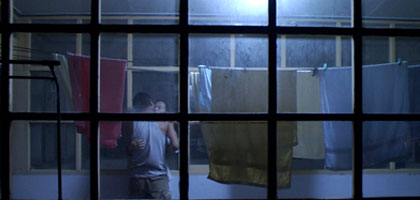Primary navigation


An engrossing and poetic debut from Thai director Aditya Assarat, Wonderful Town coolly sets the progress of a doomed love affair against the backdrop of a community devastated by the 2004 tsunami. By Tony Rayns
Aditya Assarat's excellent debut feature (he previously made a couple of outstanding shorts and co-directed the semi-documentary 3 Friends, 2005) finesses an unusual double structure. Most of the running time is devoted to a kind of holiday romance, a measured, tentative courtship between two reticent people, both carrying emotional burdens from their pasts; the woman, Na, is rooted in her place and the man, Ton, is a transient. But the film is equally, as the title suggests, an account of the town in which it's set. Takua Pa, caught between the Pacific Ocean and the mountains, was devastated by the Boxing Day tsunami of 2004 - more than 8000 people were killed or swept away - and it, too, carries a burden of unhealed wounds. Aditya invites the viewer to savour the slow-burning romance, but very discreetly undercuts the mood by hinting that 'love' cannot hope to survive in a place with this sort of recent history. And the film's conclusion makes it plain that the town's stifled anguish trumps the relatively petty insecurities of Na and Ton. The effect of this 'double articulation' in the narrative is remarkably potent. Ultimately, the film is less a love story than a response to the tsunami; this is one movie in which a cut from sexual foreplay to a shot of waves is neither coy nor evasive.
Although the film gives them minimal dialogue and backstory, the central characters are very fully realised. Ton is an architect from Bangkok; he volunteered to be the one from his office to spend two months in Takua Pa supervising the rebuilding of a beach resort hotel destroyed by the tsunami. He is also, we learn towards the end of the film, a man with a history - he's a former pub musician and alcoholic who has a broken relationship with his father. So it's easy enough to infer why his relationship with a former girlfriend fell apart and why he likes to see himself as rootless and independent. Supphasit Kansen, a magnetic screen presence, brings this character to life with hallucinatory precision, capturing his battered masculinity, his repressed self-pity and nostalgia, his slightly forced eagerness to please and the dark moods that grip him when he cannot avoid a problem. As a stranger in town, he's fully aware of the material damage caused by the tsunami, but hopelessly insensitive to the burden of grief and inchoate resentment in the community. The warning signs are clear (he has hardly said how much he enjoys being in such a quiet place before a local worker starts noisily freaking out behind him), but he either shrugs them off or fails to ask the right questions about them. When he explores a devastated seafront villa, he sees only the ruined fixtures and fittings and not the "ghosts" he has been warned to avoid.
The immediate object of his affections is Na, the Chinese-Thai owner of the rather decrepit hotel in which he lodges, and she too has unresolved 'issues'. The film's opening image shows ordinary waves rolling in on the grey sands of Takua Pa beach, and it's followed by a long-held shot of Na slowly waking from a nap; she's been dozing behind the reception desk of the hotel. The juxtaposition could imply that she's been dreaming about the ocean, or merely that her life is somehow defined by her proximity to the waves; she later says that she feels "trapped" in the town. As the film goes on she has much less to say for herself than Ton does, largely because she's so shy and nervous, but Aditya provides plenty of visual clues to her state of mind: her constant snacking, her constant hanging of laundry on the hotel's rooftop clotheslines, her would-be maternal behaviour towards her brattish nephew. Ton's unexpected arrival in her hotel is clearly the most exciting thing that has ever happened to this prematurely spinsterish woman (she listens at his door while he's taking a shower and goes shopping for beauty aids), and Anchalee Saisoontorn's performance very credibly nails the way she struggles to get past her repressions.
Watching the slow dance of attraction between these two is one of the film's main pleasures, and Aditya is careful to ground it in close observation of their everyday lives. Aside from their scenes together, Aditya spends the first half of the film crosscutting between them, comparing and contrasting their body language, their work patterns and their general demeanour. At the midpoint, though, there is an abrupt cut (softened by the ethereal score, which continues uninterrupted over both scenes) from their moment of intimacy on the roof of the hotel at midnight to a Chinese ceremony honouring the souls of the town's many dead. This scene introduces the character of Na's 'gangster' brother Wit, who will turn out to be Ton's nemesis. But it leaves open the question of why Wit refuses to help Na run the hotel, a family business - not to mention the question of what happened to the mother of his son Tee. Did she leave because Wit turned 'bad' or was she simply one of the 8000 victims of the tsunami? Aditya cunningly uses such unanswered questions to suggest that the town's communal grief has an almost ineffable dimension; Wit's motiveless malice and such things as the talk of ghosts are merely symptoms of it. It's Ton's insensitivity to this mass bad karma that makes him, in effect, the last casualty of the tsunami.
Always cutting away from spasms of sex and violence, Aditya delivers a cool, modernist piece of storytelling that is very much in line with his work in the short films Motorcycle (2000) and Waiting (2003), but has little in common with the other Thai films that have reached audiences abroad. He shares an editor with Apichatpong Weerasethakul (Lee Chatametikool, a key figure in the Thai cinema renaissance) and has worked in the past with the maverick producer Mingmongkol Sonakul (herself an interesting director), but his films are essentially sui generis, and he has no connection with the major companies producing films in Thailand. His approach is poetic, and very much focused on unexpressed thoughts and emotions; he's also highly attuned to the impact of environments on those who live in them. You could call him a 'psychogeographer' in the sense meant by Will Self when he co-opted the term from the Paris Situationists.
Film-makers like Aditya give the lie to all the talk of 'the end of art cinema' after the deaths of Bergman and Antonioni. He's a serious-minded director, here tackling palpably real psychological and emotional issues, and the nearest his film comes to the 'language' of commercial movies is when he plays a song on the soundtrack over a driving sequence. (It's a measure of his playful sense of irony that he calls his production company Pop Pictures.) As the opening credits reveal, he was able to make the film because he won support from a variety of private and public sponsors; he had a fellowship at the Sundance Institute in Utah, a year under Mira Nair's 'mentorship' thanks to a Rolex-sponsored arts initiative, and was further helped financially by the Thai corporation Singha and the Thai Ministry of Culture. Some of the post-production was underwritten by the Asian Cinema Fund administered by the Pusan Film Festival in Korea. There have been a few fatuous claims that Aditya's identity as a Thai has been somehow compromised by this international support, but the film is deeply embedded in both Thai realities and Aditya's own developing aesthetic, and all the more distinctive for it. Wonderful Town also demonstrates that it's still entirely possible to make a movie outside the framework of pop genre cinema that is engrossing, moving and, in its unassertive way, quietly entertaining.